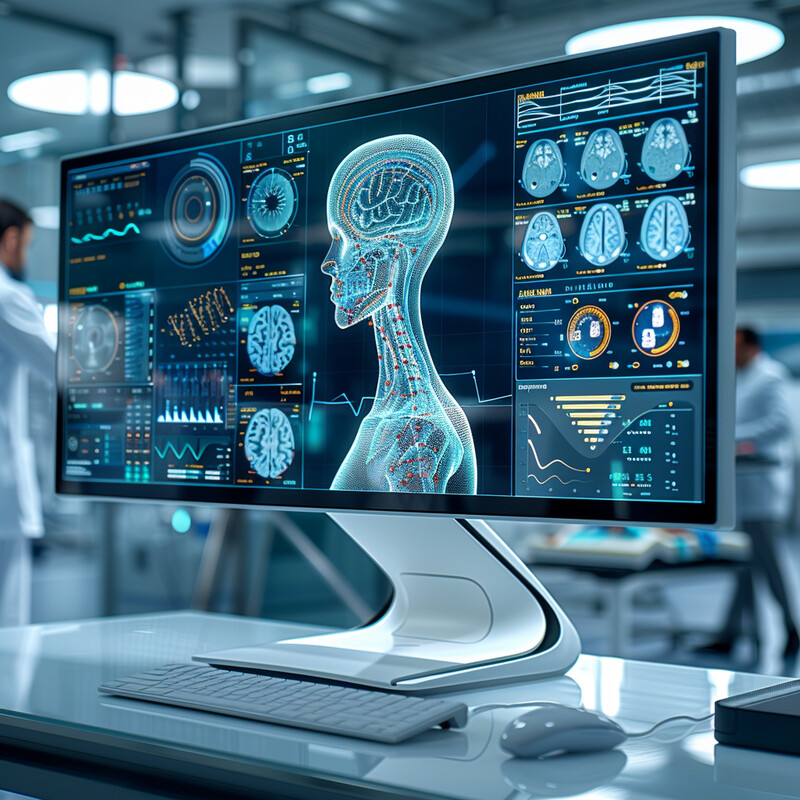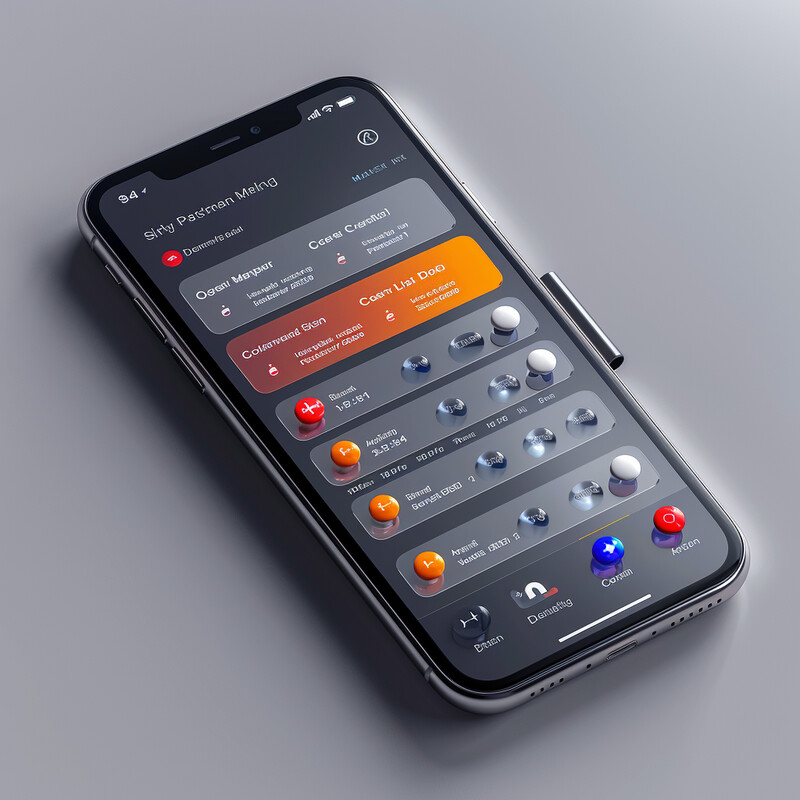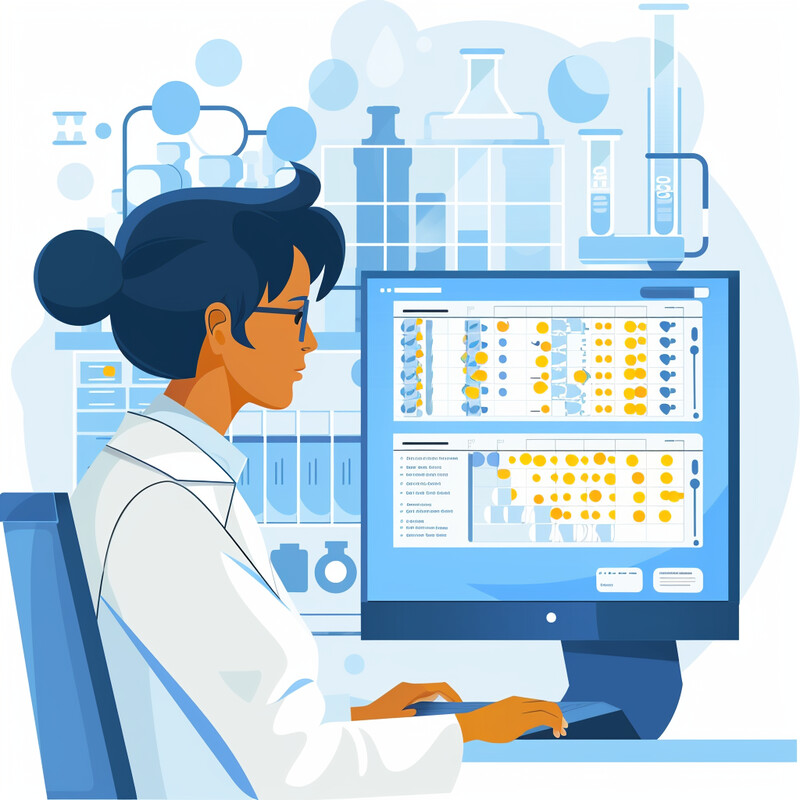1. Electronic Health Records (EHR) Integration
AI is streamlining how electronic health records are updated and utilized by health professionals. It can automatically pull together patient information from various sources (labs, pharmacies, other clinics) into one unified EHR, ensuring records are comprehensive, up-to-date, and easy to access. By handling data entry tasks – for example, transcribing doctor-patient conversations or importing lab results – AI reduces the manual workload on clinicians and minimizes human errors in documentation. Integrated AI tools also standardize data formats across different systems, which helps prevent crucial patient information from being missed when multiple providers are involved. Overall, incorporating AI into EHR systems improves the completeness and quality of patient histories available at the point of care, allowing doctors to make more informed decisions faster.
-integration-1.jpg)
A 2024 clinical study at the University of Pennsylvania demonstrated how AI-driven EHR integration can reduce administrative burden on physicians. In the study, primary care clinicians used an AI “ambient” scribe that listened to doctor-patient conversations and automatically generated visit notes in the EHR. The results showed a 20% decrease in time clinicians spent interacting with the EHR during and immediately after appointments, and a 30% reduction in after-hours charting (so-called “pajama time”) once the AI was implemented. This translated into about two extra minutes per visit for direct doctor-patient interaction and saved roughly 15 minutes of physicians’ personal time per day that would normally be spent on documentation. One physician reported that the AI system was “cutting back on my documentation time by about two hours… each week,” highlighting how such EHR-integrated AI tools can meaningfully improve efficiency and face-to-face patient time.
2. Predictive Analytics
AI-powered predictive analytics enable healthcare providers to foresee potential health events and intervene early. By analyzing historical patient data and patterns (such as past hospitalizations, lab trends, and vital signs), AI can identify patients at high risk for specific outcomes – for example, predicting which patients are likely to be readmitted after discharge or who might develop complications like sepsis. This forward-looking insight allows clinicians to implement preventive measures or personalized care plans before a problem fully develops. In practice, predictive models help tailor treatments: a care team might intensify monitoring for a patient flagged at risk of heart failure exacerbation or provide extra counseling to a diabetic patient predicted to have worsening blood sugar control. In short, AI-driven predictive analytics shifts healthcare toward a more proactive approach, catching issues sooner and improving long-term patient management by addressing risks in advance rather than reacting only after crises occur.

Hospitals are increasingly reporting tangible improvements from using AI for predictive analytics in patient care. In 2023, for instance, Corewell Health (Michigan) implemented an AI-driven program to predict and prevent hospital readmissions, focusing on patients’ recovery needs right after discharge. Over a 20-month period, this predictive analytics initiative prevented approximately 200 hospital readmissions that would have been expected based on historical trends, and it saved an estimated $5 million in healthcare costs (through avoided admissions and associated expenses). The AI system would flag recently discharged patients at high risk of complications or bounce-backs – these patients then received tailored interventions such as follow-up calls, care coordination, and help addressing social issues like transportation or nutrition. By working proactively “in advance of recovery barriers and focusing on whole-person needs,” the health system was able to keep many high-risk individuals healthier and out of the hospital. This not only improved patient outcomes but also demonstrated significant cost savings, underscoring how predictive analytics can benefit both patients and providers.
3. Data Security and Privacy
AI is playing a crucial role in protecting sensitive patient data in an era of increasing cyber threats to healthcare. Advanced machine learning algorithms monitor network traffic and EHR access logs in real time, able to detect unusual patterns (such as an employee account downloading an atypically large volume of records or a malicious program trying to encrypt files) much faster than a human could. Upon detecting anomalies or potential breaches, AI-driven security systems can automatically alert IT staff or even initiate countermeasures – for example, locking down accounts or blocking network access – to contain the threat. These tools help healthcare organizations maintain patient privacy by preventing unauthorized access to medical records and ensuring compliance with regulations like HIPAA. Furthermore, AI can assist with encryption and automatic audit trails, adding extra layers of security around patient information. In summary, by continuously “watching” for cyber intrusions or data misuse, AI enhances the security and privacy of patient data and helps hospitals avoid the financial and reputational damage associated with data breaches.

The use of AI in cybersecurity is proving to significantly reduce the impact of data breaches on healthcare organizations. According to IBM’s 2024 Cost of a Data Breach report, companies that extensively deployed AI-driven security and automation saved an average of $1.76 million per data breach incident compared to those with minimal AI defenses. These AI-enabled organizations were also able to identify and contain breaches much faster – in some cases, cutting the breach lifecycle by 108 days (nearly three and a half months) relative to firms without AI monitoring tools. This is especially critical for healthcare, which consistently has the highest breach costs of any industry. (In 2023, the average healthcare data breach cost reached about $10.9 million, versus a $4.5 million cross-industry average.) The IBM analysis highlights that investing in AI security tools – such as automated threat detection, response, and data protection systems – can greatly mitigate the damage of a breach. Faster breach detection means less time for attackers to access or exploit patient data, ultimately preserving patient privacy and saving healthcare institutions millions in breach recovery expenses.
4. Natural Language Processing (NLP)
AI’s natural language processing capabilities are transforming how unstructured text is used in healthcare. Medical practice generates enormous amounts of free-text data – think of doctors’ progress notes, hospital discharge summaries, operative reports, or even patient messages. NLP technology allows AI to “read” and interpret this text, extracting key medical concepts (like diagnoses, medications, symptoms, timelines) and converting them into structured data. This makes information buried in narrative form searchable and analyzable. For example, an NLP system might scan a thousand clinic notes to find all patients who have a history of a certain condition or to flag a potential drug allergy mentioned in passing. By structuring clinical text data, NLP enhances decision support (providers get important info at a glance) and ensures nothing critical is overlooked in patient histories. Additionally, NLP aids administrative efficiency: it can automate the coding and billing process by translating a physician’s note into the appropriate ICD-10 diagnostic codes or summarize a patient encounter into a concise report. In essence, NLP bridges the gap between human language and database-ready information, making healthcare data more usable without requiring clinicians to rigidly structure their documentation.
-3.jpg)
The adoption of AI tools that utilize NLP for handling clinical documentation and communication is on the rise. A national survey by the American Medical Association found that in 2024, about 21% of physicians reported using AI for documentation tasks such as writing chart notes or assisting with medical coding – up from only 13% in 2023. This category (which includes speech-to-text dictation with NLP, automated note generation, and coding assistants) showed one of the largest year-over-year increases in physician AI use. These NLP-driven applications help doctors by transcribing patient visits, suggesting phrasing for reports, or extracting relevant details for documentation, thereby streamlining the workflow. The survey results indicate that clinicians are increasingly trusting AI to take on time-consuming narrative tasks. Notably, other NLP-related uses were also growing – for instance, 20% of physicians used AI to help craft patient care plans or discharge instructions in 2024 – illustrating how AI’s language understanding capabilities are becoming embedded in everyday healthcare practices. As these tools continue to improve, we can expect even broader use of NLP in areas like automated transcription, clinical summary generation, and patient-provider communications.
5. Real-time Data Analysis
AI enables the real-time analysis of health data streams, allowing clinicians to receive instant insights from monitors and devices. In critical care and hospital settings, patients are hooked up to equipment that continuously outputs vital signs, ECG rhythms, oxygen levels, and other metrics. AI systems can continuously interpret this flood of data and immediately flag concerning changes that might indicate a patient is deteriorating. For example, if an ICU patient’s blood pressure and respiratory rate start trending in a problematic direction, an AI algorithm might detect the subtle pattern and alert staff hours before those values cross an obvious danger threshold. Real-time analysis isn’t limited to hospitals – for patients at home with wearables or remote monitors, AI can watch data (like a diabetic person’s glucose readings or a cardiac patient’s telemetry) and send automated alerts or adjustments (such as insulin pump changes). By catching critical changes or events the moment they occur (or even predicting them slightly before they fully manifest), AI-driven real-time analytics support prompt interventions. This immediacy can be lifesaving in emergencies, and it gives healthcare providers the ability to make data-informed decisions on the fly, rather than waiting for periodic checks or manual data review.

A recent large clinical trial demonstrated how real-time AI monitoring can save lives by detecting patient crises sooner. In 2023–2024, researchers at Columbia University tested an AI-based early warning system called “CONCERN” across two major hospital systems with over 60,000 patients. The AI continuously analyzed subtle clues in nurses’ routine notes and observations to predict patient deterioration before traditional vital signs indicated a problem. The results, published in Nature Medicine, showed that the AI system was able to identify patient decline around 42 hours earlier than standard detection methods and prompt earlier interventions, leading to a 35% reduction in mortality risk among those patients. In practical terms, CONCERN gave care teams nearly a two-day head start in treating issues like sepsis or internal bleeding that might not have been apparent initially. Patients monitored with the AI also had slightly shorter hospital stays (on average by half a day) and a modest decrease in developing severe sepsis, likely because clinicians could act on warnings sooner. This study underscores the real-world impact of real-time AI analysis: by processing data continuously and alerting staff to the faintest early danger signs, AI can significantly improve patient outcomes in acute and critical care settings.
6. Patient Data Access and Sharing
AI facilitates more seamless and secure sharing of patient data between different healthcare stakeholders. In modern healthcare, a single patient’s information might be spread across multiple systems – primary care clinics, specialists, hospitals, labs, and so on. AI can help integrate these silos by matching records that belong to the same patient and merging them, even if there are slight differences or errors in how the data is recorded (such as name spellings or missing identifiers). This ensures that all providers involved in a patient’s care have access to the complete picture, not just the fragment from their own facility. Additionally, AI can automatically translate data into standard formats (for example, converting units or coding diagnoses uniformly) which makes information exchange between different electronic health record systems smoother. On the privacy front, intelligent algorithms can manage consent and privacy rules – determining who is allowed to see what data – and can redact or anonymize information when sharing is necessary for research or public health. By taking on these complex tasks, AI reduces the friction in health information exchange, helping care teams collaborate better. Patients benefit through improved continuity of care; no matter where they go, their history travels with them, and redundant tests or mistakes from missing data are minimized.

The push for interoperability (different health systems sharing data) has seen progress, and AI is poised to accelerate it further. In the U.S., the Office of the National Coordinator for Health IT (ONC) reported that the percentage of hospitals engaging in routine electronic information exchange with outside providers climbed to 43% in 2023, up from 28% in 2018. “Routine exchange” means hospitals not only send and receive patient records, but also actively find and integrate external patient data into their own EHR systems as a standard practice. This improvement shows that more hospitals are overcoming interoperability barriers – a trend that AI can build on by automating the remaining challenges in data reconciliation. It’s noted, however, that about one-quarter of hospitals still receive data but don’t fully incorporate it, leaving a gap where important information might not be used at the bedside. AI tools can step in here by intelligently merging external data into patient charts (for example, automatically matching lab results from an outside lab to the correct patient and highlighting them for the physician). Looking forward, many health networks are experimenting with AI-driven data-sharing platforms that can summarize a patient’s entire cross-institutional record for quick review. With interoperability becoming the norm and AI handling the heavy lifting, both clinicians and patients benefit from a more connected, informed healthcare ecosystem.
7. Image Analysis
AI has rapidly become an invaluable assistant in interpreting medical images, leading to faster and often more accurate diagnoses from scans. Advanced algorithms (especially deep learning models) can be trained on millions of imaging examples – X-rays, CT scans, MRIs, ultrasounds, pathology slides, etc. – to recognize abnormalities like tumors, fractures, hemorrhages, or signs of disease. In clinical use, AI image-analysis tools act like a second pair of eyes for radiologists and pathologists: they highlight regions of interest on an image (for instance, circling a tiny lung nodule on a chest CT that might be early cancer) or even provide an initial read of what’s normal vs. suspicious. This can significantly reduce the chance of human error or oversight, as the AI may catch subtle findings a person might miss when fatigue sets in or volume is high. AI can also dramatically speed up image processing. Whereas a specialist might take several minutes per case, an AI system can triage hundreds of images in that time – flagging the urgent ones (like a possible stroke on a brain scan) to be reviewed first. Importantly, AI doesn’t replace the expert judgment but augments it: the radiologist can combine their expertise with the AI’s suggestions to make the final call. The end result is that diagnoses from imaging can be delivered more quickly and with improved accuracy, which benefits patient care by enabling timely and appropriate treatment.

In breast cancer screening, where radiologists must review thousands of mammograms, AI has shown it can both improve cancer detection rates and reduce physician workload. A large Swedish trial in 2023 tested AI-supported mammography screening versus the standard approach (which is dual reading by two radiologists). The interim results were striking: the AI-assisted screening program detected 20%–29% more breast cancers than the traditional method, with particularly better pickup of early-stage invasive cancers that are most crucial to catch early. Importantly, this increase in cancer detection did not come at the cost of a high false-positive rate – the recall rate for follow-up remained nearly the same, only about 1% higher with AI, meaning the AI wasn’t just crying wolf. Moreover, using AI significantly eased the radiologists’ workload: the trial reported a 44% reduction in the number of mammogram readings radiologists had to do, because the AI was able to triage out many normal exams. In practice, that means a radiologist could potentially read almost half as many cases while still finding more cancers, thanks to AI handling the initial scan of images. These real-world findings suggest that AI image analysis can make screening programs more effective (by catching more disease) and more efficient (by saving specialist time), a dual win for population health.
8. Automated Alerts and Reminders
AI systems in healthcare are increasingly used to deliver automated alerts and reminders that help patients and providers stay on top of important health tasks. For healthcare providers, AI can generate alerts about patient care in real-time – for example, warning when a new lab result is critically abnormal, reminding staff of a patient’s allergy before ordering a medication, or flagging that a patient hasn’t had a recommended screening (like a colonoscopy) and is due for one. Unlike traditional one-size-fits-all alerts, AI can prioritize and personalize these notifications by learning which alerts are urgent and relevant in context, thus reducing “alarm fatigue.” For patients, AI-driven reminder apps or text messaging systems provide prompts tailored to individual needs: reminding a patient to take their 8 AM medication dose, or nudging them about an upcoming doctor’s appointment, or even providing motivational messages to encourage healthy habits. These reminders can be adaptive – if a patient misses a dose, the system might follow up more persistently or alert a care manager. By automating such prompts, AI ensures that care plans are adhered to more consistently. This improves medication compliance, attendance at follow-ups, and overall disease management, ultimately leading to better health outcomes and fewer gaps in care simply due to human forgetfulness or oversight.

Intelligent reminder systems have shown remarkable success in improving patient adherence to treatments. In one 2024 pilot study, researchers deployed an AI-driven medication reminder app for patients with chronic conditions to test how much it would boost consistent medicine use. The results were dramatic: patients who received personalized daily reminders from the AI achieved 100% medication adherence, whereas the control group (who did not receive AI reminders) had only about 50% adherence to the same regimen. The AI in this program learned each patient’s schedule and habits, sending prompts at optimal times and even providing encouraging messages, which effectively eliminated missed doses during the study period. Although this was a small study, its findings align with other reports that tech-enabled reminders can significantly raise adherence rates. Healthcare providers are taking notice – many clinics now use automated texting systems (sometimes AI-enhanced) to remind patients about everything from flu shots to physical therapy exercises. Even for critical lifestyle interventions, such as weight management or smoking cessation, AI chatbots and reminder tools are being used as “digital coaches” to keep patients engaged. The 2024 adherence study offers a proof of concept that properly tuned AI reminders can double patient compliance, which in turn can lead to fewer hospitalizations and better disease control for chronic illness.
9. Chronic Disease Management
AI is enhancing chronic disease management by enabling care that is more continuous, personalized, and responsive to changes in a patient’s condition. Chronic conditions like diabetes, hypertension, heart failure, and asthma require ongoing monitoring and frequent adjustments to treatment. AI tools help by analyzing trends in patients’ health data over time – for instance, tracking blood sugar readings for a diabetic patient or peak flow readings for an asthma patient – and detecting when the condition is improving or getting worse. Through machine learning, AI can predict flare-ups or complications before they happen (such as forecasting a COPD patient’s risk of an impending exacerbation based on subtle changes in symptom reports and wearable data). Clinicians can use these insights to tailor interventions: adjusting medications preemptively, scheduling an earlier follow-up, or providing targeted education. AI-driven coaching apps also support patients directly in self-management, giving them feedback and guidance day by day (for example, an app might suggest dietary tweaks to a patient with high blood pressure by analyzing their salt intake patterns). By coordinating all this information, AI ensures chronic disease management isn’t just a series of periodic office visits, but a dynamic, real-time process. Patients receive more individualized care plans, and healthcare providers can intervene at just the right time to prevent deterioration, thereby keeping chronic conditions as stable as possible.

Real-world deployments of AI in chronic disease care are yielding promising outcomes in reducing complications and healthcare utilization. One notable example comes from a safety-net hospital in San Francisco that targeted heart failure (HF) patients with an AI-supported management program. The hospital (Zuckerberg San Francisco General) used predictive algorithms within its EHR to identify HF patients at highest risk of readmission and then provided intensive, tailored follow-up care to those individuals. Over the course of the program, the 30-day readmission rate for heart failure patients dropped from 27.9% before AI implementation to 23.9% after – a significant improvement by the end of 2023. This AI-guided initiative also had an equity benefit: initially, Black patients with heart failure at the hospital had substantially higher readmission rates than the overall patient population, but during the program this disparity was completely eliminated. In addition, by preventing avoidable re-hospitalizations, the hospital saved an estimated $7.2 million in potential penalties and costs, illustrating financial advantages alongside clinical gains. This case study demonstrates how AI can focus attention on the chronic disease patients who need the most support and help care teams deliver interventions (like early clinic visits, home care, or patient education) that keep these vulnerable patients healthier. Fewer readmissions and more equitable outcomes in the heart failure population were achieved, showing the real impact of AI-enhanced chronic disease management on both patients’ lives and system performance.
10. Clinical Trial Matching
AI is revolutionizing the process of matching patients with clinical trials, making it faster and more accurate to find trial opportunities for those who could benefit. Clinical trials have very specific inclusion and exclusion criteria (such as patient’s cancer type, stage, prior treatments, genetic markers, age, etc.), and traditionally, screening patients against these criteria has been a labor-intensive manual task. AI simplifies this by quickly analyzing a patient’s electronic health record and comparing it to the eligibility requirements of thousands of recruiting trials. Using natural language processing, AI systems can interpret free-text criteria in trial descriptions and medical jargon in patient charts to see if there’s a fit. The technology can then produce a short list of trials that a given patient is likely eligible for, sparing research coordinators from hours of paperwork and database queries. This means more patients, especially those with rare diseases or complex histories, can be considered for experimental therapies that they might otherwise miss. For the research community, it speeds up enrollment – trials can fulfill their recruitment targets faster and potentially complete studies sooner. Ultimately, AI-driven trial matching bridges patients to cutting-edge treatments and clinical research, democratizing access to trials by ensuring no potential match falls through the cracks due to oversight or information overload.

Emerging AI tools are demonstrating significant efficiency gains in clinical trial matching. In 2024, a team at the U.S. National Institutes of Health developed a system called “TrialGPT”, which uses a large language model (GPT-4) to match patient records with cancer clinical trials. In validation tests, TrialGPT was able to assess patient eligibility with an accuracy nearly equivalent to human experts – it correctly matched patients to appropriate trials almost as well as oncologists reviewing the cases by hand. Moreover, the AI greatly accelerated the process: in a pilot at the National Cancer Institute, doctors using TrialGPT to help find trials for their patients did so roughly 42% faster than those relying on manual methods. This time savings is substantial, considering how complex trial criteria can be; what might take an expert an hour of chart review and database searching, the AI can accomplish in minutes. TrialGPT works by reading both the patient’s medical data and thousands of trial descriptions simultaneously – a task impractical for an individual – and pinpointing matches (and explaining its reasoning). As a result, patients can be alerted to relevant clinical trials far more efficiently. Such AI-driven matching is expected to increase trial enrollment rates and diversity, as more patients are identified and contacted. It also helps researchers by reducing the costly bottleneck of recruitment. In short, the application of AI to trial matching is making the connection between patients and clinical research quicker and more precise, benefiting the development of new therapies.